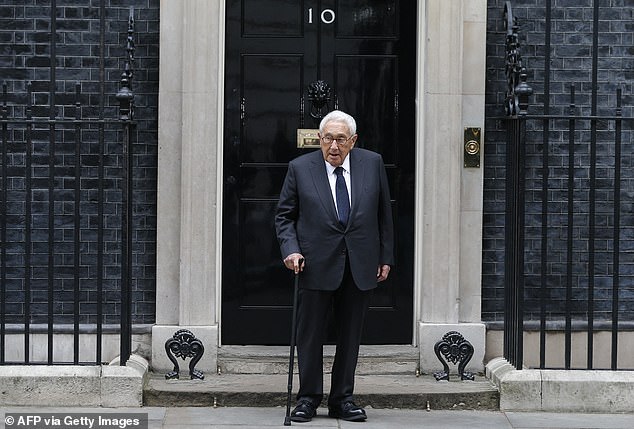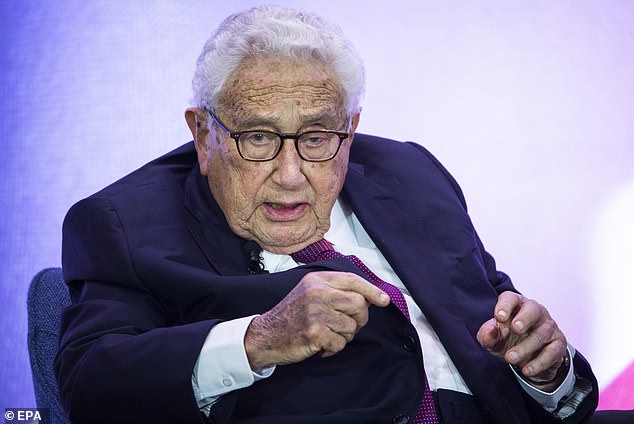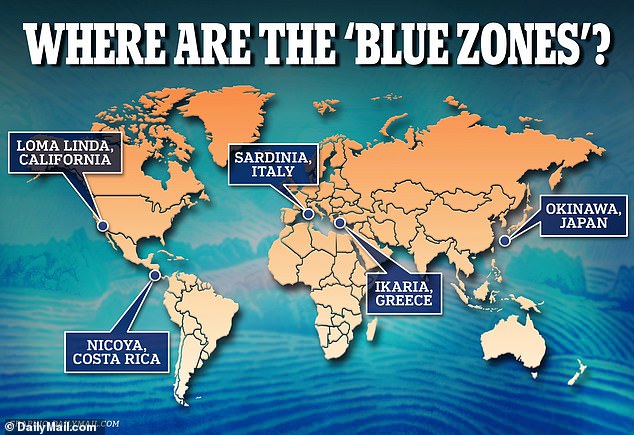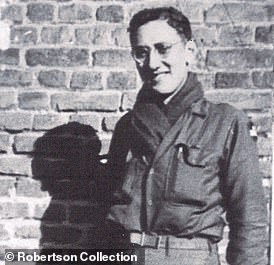The surprising reason why Kissinger reached 100 – despite his diet of bratwurst and Wiener schnitzel and his lifelong aversion to exercise
The secret to a long life is probably a combination of healthy nutrition, minimal stress and sufficient exercise. At least, that’s what we’re often told.
But what about the exceptions?
One of the best known is former Secretary of State Henry Kissinger, who died on Wednesday at the age of 100.
His longevity had long been mysterious: the influential politician was known for his fondness for fatty foods such as schnitzel and sausages, and his aversion to exercise.
David Kissinger, the late secretary’s eldest child and only son, described his father’s survival earlier this year as “miraculous.”
And in his final TV interview in October, Kissinger senior seemed as surprised as anyone that he had reached the centenary club, saying: ‘How I lived to be 100? Don’t know. I wasn’t aiming for it.’
Former US Secretary of State Henry Kissinger at Andrews Air Force Base near Washington, in 1972

Kissinger arrived at 10 Downing Street in London in 2016

Kissinger delivers remarks at the 230th Anniversary of the United States Department of State in Washington, D.C. in 2019
Theoretically, Kissinger’s lifestyle prepared him for an early grave.
Not just because of diet and no exercise, but also because of his “career of relentlessly stressful decision-making,” as his son put it.
So what’s his secret?
According to Kissinger’s son, the secret of his father’s longevity was his brainpower and relentless intellectual stimulation.
He had an “unquenchable curiosity that kept him dynamically engaged with the world,” David wrote The Washington Post in May.
David, a father of four and executive television producer, wrote that the Covid-19 pandemic did not even slow down the former secretary, who completed two books during the lockdowns.
In later life, Kissinger continued to travel and participate in speaking engagements around the world.
Despite being away from political office for a long time, Kissinger remains involved in current affairs, keeps his mind sharp and participates in debates on technology and artificial intelligence.
David, 62, wrote: “His mind is a heat-seeking weapon that identifies and grapples with the existential challenges of the day.”
David also wrote that his father’s sense of purpose was responsible for his longevity.
“The other secret to my father’s endurance is his sense of mission. Although he is portrayed as a cold realist, he is anything but emotionless.’
David continued, “He believes deeply in arcane concepts like patriotism, loyalty and bipartisanship. It pains him to see the woes in today’s public debate and the apparent collapse of the art of diplomacy.’
Kissinger Jr. isn’t the only person touting the physical benefits of a sharp mind.
Former Google CEO Eric Schmidt, who co-wrote a book on AI with Kissinger in 2022, said the former secretary never stopped working, which he said kept him alive.
Schmidt said The Tom Ferriss Podcast: ‘He works harder than a 40-year-old. I can tell you he gets up in the morning and works all day. He has dinner with his wife and family and works in the evenings.
“I’m convinced the secret to a long life is being a workaholic.”
According to Thomas Perls, director of Boston University New England Centennial StudyReaching the age of 90 is 30 percent genetics and 70 percent lifestyle.
About 70 percent can be explained by genetics if you live to age 110, he adds.
Dr. Jay Olshansky, a research associate at the University of Chicago’s Center on Aging, told DailyMail.com that genetics plays the biggest role in aging and longevity.
He said: ‘No one can live that long unless they won the genetic lottery at birth… Not all risk factors work in the same way for everyone.
‘In general, people who don’t smoke and eat healthier tend to live longer and healthier lives.
“If only we could know in advance, at a younger age, whether we fall into the category of someone who can live a long life with challenging risk factors, many would adjust their lifestyles accordingly.”
Kissinger’s mother and father, Paula and Louis Kissinger, died at age 97 in 1998 and at age 95 in 1982, respectively.
The former secretary was born Heinz Alfred Kissinger in 1923 in the small town of Fürth, a city in northern Bavaria, Germany.
Life expectancy for people born in Germany around that time ranged from 42 to 56 years old.
Kissinger, who was Jewish, fled Nazi Germany and moved to the US with his family in 1938 at the age of 15. At the time, life expectancy for men in the US was 62 years.
Thirty years later, former President Richard Nixon appointed Kissinger national security adviser in January 1969. He subsequently became Minister of Foreign Affairs in September 1973, a position he held until January 1977.
With his second appointment, he became the first person ever to serve as both Secretary of State and National Security Advisor.
Twenty years ago, Kissinger joined the “SuperAgers,” the group of people aged 80 and older who remain mentally sharp and generally healthy. These SuperAgers don’t necessarily follow a lifestyle that doctors recommend, such as a healthy diet and exercise, but they maintain their cognitive skills.

A docuseries on Netflix titled Live to 100: Secrets of the Blue Zones delves into five places with “blue zone” status: Okinawa, Japan; Sardinia, Italy; Nicoya, Costa Rica; Ikaria, Greece; and Loma Linda, California
Longevity experts suggest other factors play a role, including strong social connections, daily routines and habits.
Elderly people who received visits from family and friends once a month appeared to live longer than those who received fewer visits, recent research shows. study found it.
Research among people living in the ‘Blue Zones’ – areas of the world with lower rates of chronic disease and generally healthier residents who live into their 90s and often live beyond 100 – shows that nine lifestyle habits are most important for a long life. to live.
These include: incorporating exercise and activity into daily life, a sense of purpose, finding ways to reduce stress, stopping eating before you feel uncomfortably full; following a plant-based diet; moderate and regular alcohol intake; to trust; focused on family and relationships; and a strong social circle.
Although Kissinger was not born in or a resident of a Blue Zone, he followed some of these habits, especially the sense of purpose.
Dr. Olshansky told DailyMail.com that these factors are “interesting and marginally relevant,” but “choosing” long-lived parents is one’s best chance of living well into old age.
He added: “I would start by choosing long-lived parents. Then avoid behavioral risk factors that shorten life. Then choose a healthy lifestyle. Even then there will still be a wide variation in lifespan.’

